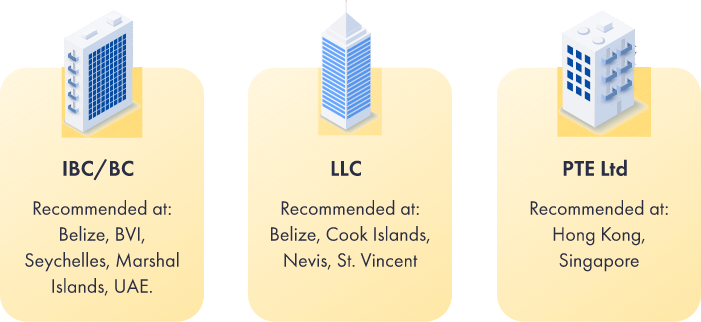How to Register an Offshore Company in 2022
Over the past few years, offshore companies have become a familiar term for many entrepreneurs, and related topics are gaining more and more attention.
Tax optimization, asset protection, and confidentiality are just a few advantages that have created a great demand for offshore companies. There are many popular destinations, such as Malta, Belize, Bulgaria, etc. While registering an offshore company can be a relatively straightforward process for some entrepreneurs, others have experienced difficulties along the way. In any case, We will inform you on how to open an offshore company and note everything necessary for a smooth process.
1. The Preparation Phase.

It is beneficial to have a basic understanding of the reasoning behind offshore companies and the related matters, so you can reduce the likelihood of making any errors.
If you feel that you need more basic information, You can read our article
“Everything you need to know before setting up an offshore company”
Choosing a good service provider is one of the most important factors when you decide to incorporate. The service firm will collect all the information you need, collect all the necessary documents, and then register and establish your company. This firm will also make it easier for you to manage post-registration administrative tasks, such as renewals, filing financial statements, annual tax returns, etc.

Always consider the following:
- Company experience and history
- Physical location
- List of jurisdictions in which the firm is active
- Service cost
- Having a quality customer support service
- And most importantly: The company’s reputation
Once you have decided on a partner to open your offshore company, you must also be aware of the cost of registration, as well as fees for a certificate of incorporation, register of directors, and filing of documents. It is possible that there are other services you might need as well, namely:
- Opening a bank account
- Registration of seals
- Office rent
- As well as services like apostille, virtual office, etc.
You can learn more about the additional services you might need to set up your offshore company
2. IBC, LLC, Pre LTD: Which Company Type To Choose?
An offshore company is a very broad concept. Depending on the jurisdiction and business structure you choose, the service provider will offer you the best option to take advantage of as many benefits.
As a rule, there are three structures of an offshore company:

IBC/BC
- Can take part in international trade or investment
- Enjoy low tax rates as long as the IBC does not operate within that jurisdiction
- Quick registration
- Banking and corporate confidentiality
- Minimum reporting requirements
- At least 1 director and 1 shareholder (both can be the same person)
LLC
- Hybrid corporation and partnership
- Enjoy the absence of local corporate tax - if the company does not operate within the jurisdiction
- Participants are only liable to the extent of their contribution, therefore they are not personally liable for debts or obligations
- Members instead of shareholders and directors
- Minimum reporting requirements
- Minimum 1 participant
Pre Ltd
- A private company with less than 50 shareholders
- Shareholders have the option of limited liability
- Your company will be empowered to enter into contracts, acquire assets, sue
- Low tax rates or exemption from taxes on income that was received outside the jurisdiction
- Shareholders are prohibited from the public sale of shares
- More reporting requirements than IBC.
3. Choosing The Right Offshore Jurisdiction
The location of the jurisdiction is important – we want to help you come up with an informed decision.
The jurisdiction should be a well-adapted option that can meet the needs of your business.
As a good example, if you are looking for a place with a good reputation and conditions for foreigners, you should avoid countries with zero income tax
The good reputation of a jurisdiction (its economy, politics, legal framework) reflects not only on stability but also helps demonstrate the credibility and reliability of your business.
If you consider working with EU markets, then you should highly consider Bulgaria, which offers the lowest income tax in the EU, and is easygoing with foreigners (and is highly reputable)
Learn more about Setting up a business in Bulgaria
To avoid further disappointment, study the match between your country of residence and potential offshore jurisdiction. Some countries have lists of residents who are not eligible to set up companies.
Paying taxes and your ability to minimize them and optimize your income, play an important role when choosing an offshore jurisdiction. Many offshore countries practice favorable low taxes on income received from foreign sources. You should be well aware and informed about taxes in the country where you intend to incorporate – as each jurisdiction may apply different tax systems.
4. The process of registering your offshore company.
Let’s have a look at the registration process:
4.1. The name of the company
There are certain requirements for company names. Failure to comply will result in your name not being approved by the local Registrar of Companies.
Basic name requirements:
- Uniqueness and dissimilarity to existing names in the registry
- The name of the company should not contain prohibited words such as Fund, Casino, Trust, Insurance, Securities, Pharmacy, Construction, etc.
- The name of limited liability companies must have the following suffixes: “Limited”, “LTD.”, “Corporation”, “Corp.”, “Incorporated”, “Inc.”, “LLC”, “Société Anonyme”, “S.A.”, “Gmb”, “Namloze Vennootschap”, “Berhad”, etc - depending on the jurisdiction.
- Checking the titles and looking for available titles will make your next registration much easier.
4.2. The name of the company
A comprehensive audit is needed to exclude work related to illegal activity. The list of documents included in this check differs in each offshore jurisdiction, but there are features in common, such as:
Basic requirements for diligence obligations:
- A certified copy of your supporting documents;
- A certified copy or original of a document confirming your address of residence;
- Detailed description of your activity;
If your company has a shareholder who is the corporate body, then you must provide the following:
- Certified copy of Incorporate Certificate or equivalent;
- Certified copy of Memorandum of Association;
- Certified copy of Registers of Directors and Members.
4.3. Delivery of documents to the Company Registry
After all the documents are ready, all you have to do is send them to the Registrar of Companies of your chosen jurisdiction, and you can start registering your offshore company!
5. WeFormOnline is your ideal partner all the way!
We sincerely hope that our article has helped you understand the most important factors to consider.
Setting up an offshore company is relatively easy if you are aware of all the pitfalls. Hiring an offshore service firm is the best way to get around most setbacks with ease.
WeFormOnline will do everything for you – The only thing that is required of you is to communicate with our consultants in order to approve all the details. then we will independently contact the local Registrar and send all your documents.
This will give you the opportunity to register your company in a couple of days and optimize your time for doing business.
Don’t hesitate to discuss your needs with our team – we will find a solution for you!
